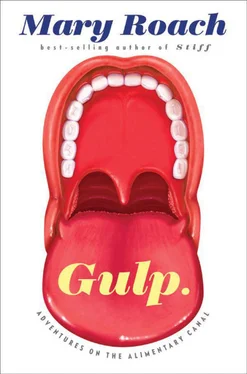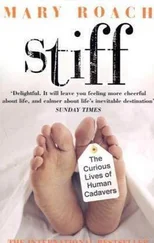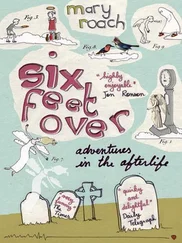Here’s the other reason: “After many days in which the priest tried to dispel the devil, he learned from the possessed mother superior that the devil had barricaded himself inside…” Here my translator stopped. She leaned closer to the photocopied pages and traced the words with her finger. “… il posteriore della superiora . Inside her butt!”
Sensing that the situation had progressed beyond his expertise or comfort level, the exorcist called for outside help in the form of a pharmacist, “Signor Adam,” and his traveling syringe. (Enemas in those days were the purview of pharmacists and comprised a sizable percentage of their income.) Mr. Adam “filled up the syringe with holy water and gave the miracle clyster to the mother superior, with his usual skill.” Two minutes later the devil had vamoosed.
Books about the Loudun fracas, including a 1634 translation of an account by “an eyewitness,” include no mention of Mr. Adam or rectal exorcism, but they do serve to flesh out the story. Grandier was convicted of sorcery and burned at the stake, and most sources agree he’d been framed by des Anges, acting in cahoots with a rival priest. The “possessions” continued for several years after the execution, spreading to sixteen other nuns and turning the convent into a local tourist attraction, and understandably so: “They… made use of expressions so indecent as to shame the most debauched of men, while their acts, both in exposing themselves and inviting lewd behavior… would have astonished the inmates of the lowest brothels in the country.”
In the words of my translator Rafaella, responding to the material I had engaged her to read, “I am sorry, but nuns should be allowed to have sex.” Or at least an occasional holy-water enema.
• • •
AROUND THE TIME doctors took to serving dinner through “the other mouth”—as Mütter Museum curator Anna Dhody has called the anus—a phenomenon called antiperistalsis began cropping up in medical journals. This was distinct from the fleeting reverse-peristaltic lurch of vomiting, wherein the small intestine squeezes its contents backward into the stomach, whose sphincters have opened to grant through-passage. That is normal.
This is not. “For eight days this person, at least once and sometimes twice in twenty-four hours, vomited veritable feces, solid, cylindrical, of a brown color and with the normal faecal odor, coming evidently from the large intestine.” The patient was a young woman, admitted to a hospital in Lariboisière in 1867, under the care of a Dr. Jaccoud, for a bout of hysterical convulsions. This was not the first alleged case of “defecation by the mouth.” Writing in 1900, Gustav Langmann summarized eighteen case reports of widely varying plausibility.
Jaccoud assumed his patient had an intestinal obstruction. When digesta backs up to the point that it threatens to burst the pipes, an emergency measure called “faeculent vomiting” kicks in. But the material in that case is highly liquid, coming, as it does, from the small intestine. A well-formed stool does not exit the upper end of the colon.
Besides, the woman showed no symptoms of a life-threatening obstruction. “Apart from the passing disgust which followed the act,” Jaccoud noted, “the patient ate as usual and continued in her ordinary health.” Things simply appeared to be running in reverse. Jaccoud’s colleagues suspected he’d been had. Defecation by mouth was a showstopper in the tradition of stomach snakes or the birthing of live rabbits (which turned out to have been sequestered in the woman’s skirts). Experts would travel great distances to observe a spectacle of this caliber. For the lonely or neglected patient who craves attention, it was just what the doctor ordered.
In 1889, Gustav Langmann put an alleged reverse-defecator to the test. A twenty-one-year-old schoolteacher, identified as N.G., had been admitted to the German Hospital of New York on and off for over a year, with the complaint of repeated spells of vomiting. On May 18 of that year, witnesses reported she threw up “hard scybala” the size of malted-milk balls. “It seemed,” wrote Langmann in his paper, “to be a favorable time to experiment in regard to the carriage of substances from the rectum to the mouth.”
At 11:01 A.M., Dr. Langmann injected just under a cup of water tinged with indigo dye into the woman’s rectum. “Blue feces took its natural course,” which is to say it emerged from the customary direction. A few days later, a nurse reported having discovered “some hard feces, wrapped in paper,” under the woman’s pillow. Langmann reports that she later tried her “tricks” at two other medical facilities.
Human beings do not defecate through the same orifice they eat with. That is a feat reserved for the cnidarians [111] Pronounced “nidarians.” But not to be confused with the Nidarians, elite players of the online game Remnants of Skystone. The cnidarians are covered with stinging cells. The Nidarians are covered with purple mold and are entitled to “two extra attacks per class,” “a 10 percent discount when using Spores,” and “more baking and brewing possibilities.”
—sea anemones and jellyfish being the best-known examples.
Contributing to the confusion about “antiperistalsis” was the fact that the normal waves of intestinal peristalsis run in both directions. It’s a mixing function. The better the digesta circulate, the more nutrients come in contact with the villi. Though the net movement is forward, it is, as Mike Jones put it, a “two-steps-forward-one-step-back phenomenon.”
Look up antiperistalsis in the medical literature, and you will come across a brief, curious phase in the history of surgery. In 1964, a team of northern California surgeons took an ambitious and iconoclastic approach to curing chronic diarrhea and improving absorption. To slow forward transit through the small intestine, they removed a six-inch segment of it, turned it around, and stitched it back in place.
Jones points out that the body has a tendency to rewire itself as it sees fit. A 1984 study followed four patients who’d had the operation. Within two years, the diarrhea had returned.
For milder cases, a shift of perspective may be helpful. “When I see a patient with a little bit of diarrhea,” Michael Levitt told me, “I say, ‘Just be happy you’re not constipated.’”
16. I’m All Stopped Up
ELVIS PRESLEY’S MEGACOLON, AND OTHER RUMINATIONS ON DEATH BY CONSTIPATION


LENIN’S TOMB IS unusual among public memorials in that it displays the man’s actual remains. As such, it attracts not only those who wish to pay respect, but others, like me, who are simply curious. Either way, death demands a respectful silence, and one cannot easily distinguish mourner from gawker. I was reminded of Lenin’s tomb when I visited the Mütter Museum, in Philadelphia, to view the remains of a man identified as J.W. There was the glass case and the careful curatorial lighting, the transfixed but largely unreadable faces of the visitors, the general hush and horror of it.
The J.W. vitrine doesn’t exhibit a corpse—just a colon. That this glass case is not much larger than the one that holds Lenin tells you two things: Vladimir Ilyich Lenin was a small man, and the colon of J.W. was enormous: twenty-eight inches around at its most distended point. I remember standing there thinking, It wears the same size jeans as me . A normal colon, perhaps three inches around, has been laid alongside for scale.
Читать дальше














